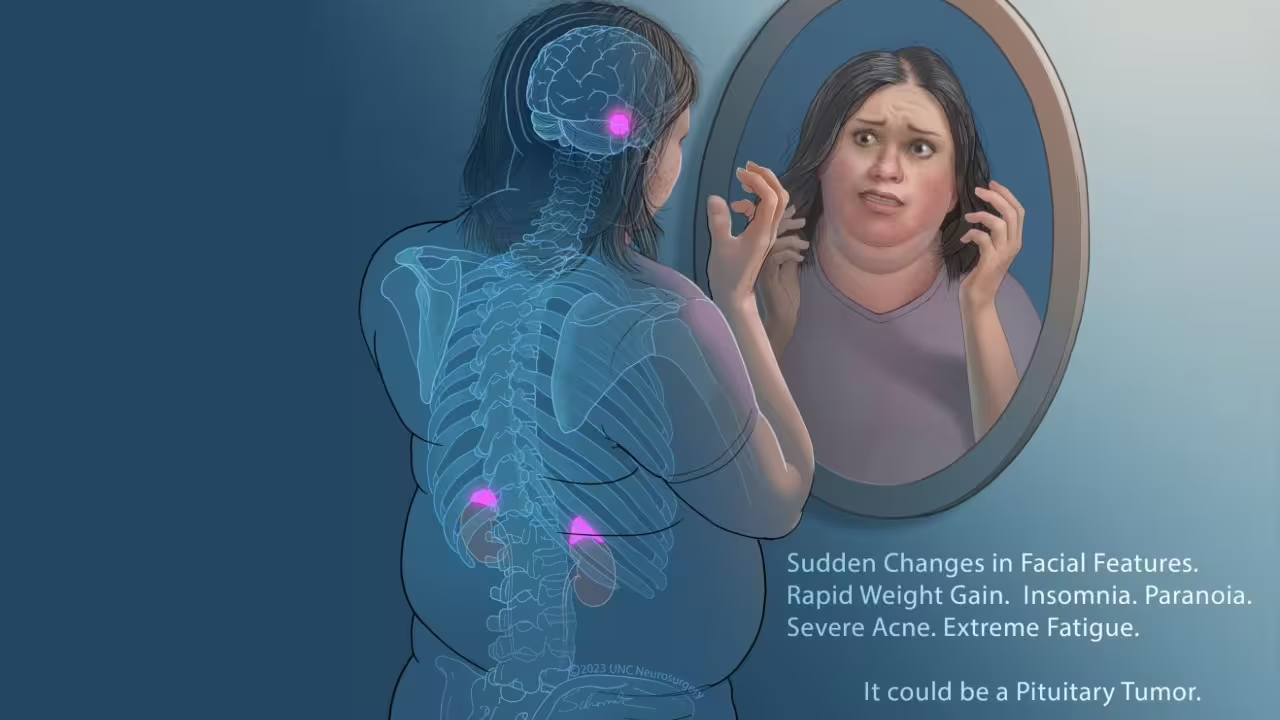ACTH hormone isn’t just some random science term - it’s a key player in how your body handles stress, balances hormones, and keeps things in check. Sounds serious, right? But don’t worry - we’re breaking it all down in plain, no-nonsense language.
From what ACTH actually is, how it’s made, what it does in your body, to the tests that check its levels, disorders linked to it, and how it's treated - this blog covers it all. Whether you’re revising for exams, trying to make sense of symptoms, or just curious about how your hormones work, this one’s got you covered.
What is ACTH? And Why It’s More Important Than It Sounds
ACTH stands for Adrenocorticotropic Hormone, and it’s a hormone made by the pituitary gland (that pea-sized part of your brain doing way more than it gets credit for). ACTH’s main role is to tell your adrenal glands - the tiny glands sitting above your kidneys - to produce cortisol.

Now, cortisol isn’t just the “stress hormone” people casually mention. It helps with a bunch of vital things like:
- Keeping your blood pressure stable
- Managing how your body uses fats, carbs, and proteins
- Regulating your sleep cycle
- Reducing inflammation
- And most importantly, helping you cope with stress
So basically, ACTH is the messenger that keeps your body functioning smoothly under pressure. If ACTH levels are off - too low or too high - it messes with your entire hormone balance. You might feel super tired, dizzy, anxious, or even lose weight unexpectedly.
That’s why understanding ACTH isn’t just biology trivia - it’s important for real-life health, especially if you're dealing with conditions related to the adrenal glands or pituitary.
Whether you’re prepping for exams, revising hormones in the endocrine system, or just trying to figure out what this term means on a medical report - understanding ACTH is a smart place to start.
What Causes ACTH to Increase or Decrease?
The ACTH hormone (full form: Adrenocorticotropic Hormone) doesn’t just randomly go up or down - there are clear reasons behind it. These shifts usually signal something going wrong with either your pituitary gland or adrenal glands.

When ACTH Levels Increase
High ACTH levels mean your body is trying hard to push out more cortisol - the stress-handling hormone. Here’s what could cause that:
1. Adrenal Gland Damage (Addison’s Disease)
When your adrenal glands can’t make enough cortisol, the pituitary sends more ACTH to “wake them up.”
2. Pituitary Tumors (Cushing’s Disease)
Some pituitary tumors make too much ACTH on their own, leading to excess cortisol and symptoms like weight gain and high blood pressure.
3. Ectopic ACTH Production
Rare tumors in other parts of the body (like lungs) can produce ACTH too - not from the pituitary at all.
4. Stress or Illness
Your body naturally increases ACTH during injury, infection, or mental stress to help you cope.

When ACTH Levels Drop
Low ACTH means your pituitary isn’t sending enough signals - which then causes cortisol levels to drop too. This usually happens in:
- Pituitary Damage or Tumors
If the pituitary is injured, removed, or not functioning, ACTH production goes down.
- Long-Term Steroid Use
External steroids tell your body “Hey, we already have cortisol,” so your pituitary stops making ACTH.
- Sudden Stopping of Steroids
If someone stops taking steroids suddenly, the pituitary doesn’t react fast enough - ACTH stays low, causing fatigue, low blood pressure, and more.
Any imbalance in ACTH levels - too much or too little - is a big clue that your body’s hormone balance system (called the HPA axis) needs checking. That’s why ACTH and cortisol tests are often done together to figure out the root problem.
What ACTH Does – And Why Cortisol Is Its Sidekick
ACTH (Adrenocorticotropic Hormone) plays a key role in how your body handles stress, energy, and overall balance. It’s produced by the pituitary gland in your brain and its main job is to tell your adrenal glands (the ones sitting above your kidneys) to release cortisol - the hormone that keeps your body going during pressure.

Cortisol isn’t just the “stress hormone” like people casually say - it’s involved in:
- Regulating blood pressure
- Controlling blood sugar levels
- Balancing energy use
- Keeping inflammation in check
- Supporting the immune response
And ACTH controls how much of this cortisol is released. So basically, ACTH is the on-switch that activates cortisol when your body needs it - like during exams, illness, fasting, or even while just waking up.
ACTH and Cortisol: A Daily Cycle
Your ACTH levels follow a natural rhythm. They rise early in the morning to help you wake up and feel alert, then gradually drop throughout the day. This cycle also keeps your cortisol in check - so if ACTH is too high or too low, it throws off your whole body clock.
TL;DR – Why ACTH Matters So Much:
- It controls how much cortisol your body makes
- It helps you react to stress, injury, low energy, or illness
- It affects your immune system, metabolism, and mood
In short, if ACTH isn’t doing its job properly, your entire stress-response system gets thrown off.
Symptoms of ACTH Imbalance – What You Might Feel
When your ACTH levels are off - either too high or too low - your body starts acting weird, and not in a subtle way. These symptoms usually show up because cortisol, the hormone ACTH controls, also gets thrown out of balance.
.avif)
Let’s break it all down:
If ACTH Is Too High (Excess ACTH)
This usually means your body is making too much cortisol, a condition often linked to Cushing’s syndrome.
You might notice:
- Weight gain, especially around the belly, face, or upper back
- Round, puffy face (often called “moon face”)
- High blood pressure
- Muscle weakness or fatigue
- Mood swings, anxiety, or even depression
- Irregular periods (in females)
- High blood sugar or diabetes-like symptoms
If ACTH Is Too Low (ACTH Deficiency)
This leads to low cortisol levels, often related to Addison’s disease or pituitary issues.
Symptoms might include:
- Extreme tiredness, even after rest
- Low blood pressure, dizziness on standing
- Unexplained weight loss
- Darkening of the skin (especially around joints or scars)
- Low mood, irritability, or brain fog
- Cravings for salty foods
- Nausea, vomiting, or stomach pain
Why These Symptoms Matter
Because ACTH affects so many body systems, even a small imbalance can make you feel “off” in multiple ways - physically and mentally. And these signs usually don’t improve on their own unless the hormone levels are brought back to normal.
So if someone’s facing these issues without a clear reason, checking ACTH might be a smart next step.
What Happens If ACTH Disorders Are Ignored?
ACTH imbalance (either too high or too low) directly affects cortisol production, which controls stress, immunity, metabolism, and more. Ignoring ACTH disorders can lead to serious, long-term health issues.

When ACTH Is Too High (e.g., Cushing’s Disease)
When ACTH is produced in excess, the adrenal glands pump out too much cortisol. This condition is often seen in Cushing’s disease, commonly caused by a pituitary tumor.
Signs to watch out for:
- Sudden weight gain (especially on face and belly)
- “Moon face” and fat buildup on the upper back
- Weak muscles and fragile bones
- High blood sugar and risk of type 2 diabetes
- Severe mood swings - depression, anxiety, irritability
- Skin issues - acne, purple stretch marks
- Irregular periods or decreased fertility in females
If left untreated, it can cause heart disease, osteoporosis, and serious hormonal damage.

When ACTH Is Too Low (e.g., Addison’s Disease)
Low ACTH levels - not enough cortisol, which means your body can’t handle stress, infection, or even regulate blood pressure properly. This is seen in Addison’s disease and adrenal insufficiency.
What can happen:
- Extreme tiredness, even with rest
- Sudden weight loss
- Dark patches on the skin (especially joints and gums)
- Low blood pressure - dizziness or fainting
- Salt craving and dehydration
- Adrenal crisis – a medical emergency that can be fatal
If untreated, low ACTH can shut down the body’s stress response, putting you at risk even during minor infections or injuries.
Why You Shouldn’t Ignore ACTH Imbalance:
If you notice sudden energy loss, unexplained weight changes, or blood pressure fluctuations - don’t brush it off. ACTH-related disorders are serious, but they’re also manageable if caught early.
Diagnosis – How Doctors Check ACTH Levels
When doctors suspect a problem with ACTH or cortisol levels, they use specific tests to confirm what’s really going on in your body. Here are the main ones - explained clearly:
.avif)
1. Blood Test for ACTH & Cortisol
- Purpose: Check the levels of ACTH and cortisol in your blood.
- When taken: Usually early morning (between 7 - 9 AM) - that’s when levels are most accurate.
- Why it's done: Helps doctors see if your pituitary or adrenal glands are underactive or overactive.
- Key use: First basic test to screen for hormone imbalance.
2. ACTH Stimulation Test (a.k.a. Cosyntropin Test)
- Purpose: Tests how well your adrenal glands respond to ACTH.
- Process: You get an injection of synthetic ACTH - cortisol levels are checked after 30–60 mins.
- What it tells:
- Low response - possible adrenal insufficiency (like Addison’s disease)
- Normal rise - adrenal function is likely okay.
- Use: Very common test to rule out or confirm adrenal failure.
3. Dexamethasone Suppression Test
- Purpose: Measures if your body can properly suppress cortisol when given a steroid.
- Process: You take dexamethasone (a corticosteroid) - cortisol is tested the next morning.
- What it shows: If cortisol doesn’t drop, it may be Cushing’s syndrome (too much ACTH or cortisol).
- Use: Detects problems in the feedback loop between brain and adrenal glands.

4. MRI or CT Scan (Imaging Tests)
- Purpose: Looks for physical causes of abnormal ACTH production - like tumors.
- MRI scan: For pituitary gland (in your brain).
- CT scan: For adrenal glands (above your kidneys).
- Use: Usually done after hormone test results look abnormal, to locate exact cause.
Quick Summary Table
When Do Doctors Recommend These?
If a person shows signs like:
- Extreme tiredness, weight changes, skin darkening.
- Mood issues, low blood pressure, or muscle weakness (doctors often suspect hormonal imbalance and order these tests).


.svg)










.avif)








